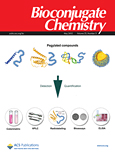
BIOCONJUGATE CHEMISTRY
metrics 2024
Connecting Chemistry with Cutting-Edge Biology
Introduction
BIOCONJUGATE CHEMISTRY, published by the American Chemical Society, is an esteemed journal that has been at the forefront of innovative research since its inception in 1973. With an impressive impact factor and a robust reputation, it occupies the Q1 category in fields such as Bioengineering, Biomedical Engineering, Biotechnology, Organic Chemistry, Pharmaceutical Science, and Pharmacology, making it a vital resource for researchers, professionals, and students alike. Its rigorous peer-reviewed articles explore the diverse and rapidly advancing realm of bioconjugate chemistry, offering pivotal insights into applications that bridge chemistry with biology. Though not an Open Access journal, it ensures wide distribution through various academic platforms, making critical research accessible to the scientific community. With its high Scopus rankings, specifically Rank #23 in Organic Chemistry and Rank #25 in Pharmaceutical Science, the journal exemplifies excellence in scientific communication and serves as an essential platform for the dissemination of groundbreaking findings in the interdisciplinary field of bioconjugates.
Metrics 2024
 1.08
1.08 4.00
4.00 4.30
4.30 192
192Metrics History
Rank 2024
Scopus
IF (Web Of Science)
JCI (Web Of Science)
Quartile History
Similar Journals
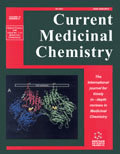
CURRENT MEDICINAL CHEMISTRY
Catalyzing Breakthroughs in Health Sciences.Current Medicinal Chemistry is a leading journal published by Bentham Science Publishers Ltd, known for its rigorous focus on the multifaceted realm of medicinal chemistry. With an ISSN of 0929-8673 and E-ISSN 1875-533X, the journal plays a crucial role in disseminating high-quality research findings that bridge the gap between chemistry and health sciences. Operating from Sharjah, United Arab Emirates, it has been a prominent scholarly resource since its inception in 1994, and is expected to continue until 2024. Current Medicinal Chemistry has earned its place in the academic community with an impressive impact factor and categorization in Q1 and Q2 quartiles across various disciplines, including Organic Chemistry, Biochemistry, Drug Discovery, and Pharmacology, highlighting its substantial contribution to these fields. Notably, it ranks 24th in Organic Chemistry and is within the 88th percentile, underscoring its appeal to researchers, professionals, and students alike who are keen on exploring cutting-edge advancements in drug design and development. Although it is not an open-access journal, it provides vital content that informs and inspires innovation in medicinal chemistry, appealing to a global audience committed to enhancing human health through scientific discovery.
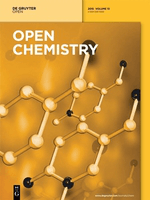
Open Chemistry
Empowering the Global Chemistry Community Through Open ResearchOpen Chemistry, published by DE GRUYTER POLAND SP Z O O, is a distinguished peer-reviewed journal that has been serving the global chemistry community since its inception. With an ISSN of 2391-5420 and an E-ISSN also of 2391-5420, this open-access journal has been accessible to researchers and practitioners alike since 2015, ensuring a wide dissemination of high-quality research findings. Located in Germany, specifically at BOGUMILA ZUGA 32A STR, 01-811 WARSAW, MAZOVIA, POLAND, Open Chemistry aims to publish innovative research across various chemical disciplines, with special attention to miscellaneous chemistry and materials chemistry. It is currently ranked in the Q3 category for both fields as of 2023, reflecting its solid standing within the academic community, with specific ranks of 187/408 in General Chemistry and 153/317 in Materials Chemistry, corresponding to respective percentiles of 54 and 51. Open Chemistry not only enhances the accessibility of cutting-edge research but also serves as a vital resource for students, professionals, and scholars seeking to advance their knowledge in the rapidly evolving landscape of chemical sciences.
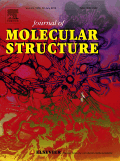
Journal of Molecular Structure
Illuminating the complexities of molecular behavior.Journal of Molecular Structure is a premier publication in the field of chemistry, offering a platform for innovative research that spans analytical, inorganic, organic chemistry, and spectroscopy. Published by Elsevier in the Netherlands, this journal is committed to advancing the understanding of molecular architecture and behavior through high-quality, peer-reviewed articles. With its impressive impact factor and a notable Scopus ranking placing it in the top quartiles among its peers, it serves as an essential resource for researchers, professionals, and students alike. The journal's open access options promote the dissemination of knowledge, ensuring that groundbreaking discoveries reach a broad audience. Established in 1967 and projected to continue through 2025, the Journal of Molecular Structure is vital for anyone engaged in the study of molecular interactions and structural analysis.
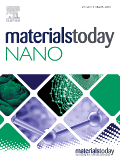
Materials Today Nano
Unveiling the Potential of Nano-Materials Across DisciplinesMaterials Today Nano, published by Elsevier, is a premier academic journal dedicated to the forefront of nano-materials research, encompassing innovations and advancements in biomaterials, condensed matter physics, electronic, optical, and magnetic materials, as well as materials chemistry. With an impressive Q1 ranking across multiple categories, including biomaterials and materials chemistry, this journal serves as a essential platform for researchers, professionals, and students aiming to contribute to and stay informed on cutting-edge developments that push the boundaries of materials science. Its open access model allows for wider dissemination of high-impact findings, ensuring that the research reaches a global audience. Operating from the United Kingdom, Materials Today Nano plays a vital role in fostering interdisciplinary collaboration and advancing scientific understanding in this rapidly evolving field.
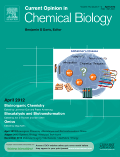
CURRENT OPINION IN CHEMICAL BIOLOGY
Championing Excellence in Chemical BiologyCurrent Opinion in Chemical Biology, published by Elsevier Science Ltd, stands at the forefront of its field, specializing in analytical chemistry and biochemistry. With an impressive impact factor and ranked in the top quartile (Q1) for both its disciplines, this journal consolidates significant advancements and perspectives in chemical biology from 1997 to 2024. Its Scopus rankings reflect its prestigious standing, with the journal positioned at #11 in Analytical Chemistry and #32 in Biochemistry, indicating a remarkable percentile standing of 93rd and 92nd, respectively. With a commitment to highlight cutting-edge research and foster scholarly dialogue, Current Opinion in Chemical Biology serves as an invaluable resource for researchers, professionals, and students seeking to stay abreast of the latest developments and innovations in the chemical biology landscape.

MOLECULES
Unleashing Potential in Analytical and Pharmaceutical SciencesMOLECULES, published by MDPI, stands as a prominent open-access journal dedicated to the field of chemistry, with an exceptional reputation in various sub-disciplines. Since its inception in 1997, this journal has committed itself to the dissemination of innovative research, spanning topics in Analytical Chemistry, Organic Chemistry, Pharmaceutical Science, and Drug Discovery. With impressive rankings across Scopus categories—including a coveted Q1 designation in both Analytical Chemistry and Pharmaceutical Science—MOLECULES is recognized as a vital resource for researchers, professionals, and students aiming to stay at the forefront of scientific development. The journal’s data reflect its wide-ranging influence, holding high percentiles in multiple chemistry categories, thereby ensuring that its articles reach a significant audience. As an open-access journal, it provides unparalleled access to its content, available freely and globally, which promotes further advancement and collaboration within the scientific community. Its ongoing commitment to high-quality research from 1996 to 2024 reinforces its status as a leader in the academic publishing landscape.
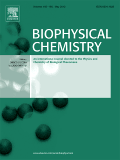
BIOPHYSICAL CHEMISTRY
Fostering groundbreaking discoveries in biophysical chemistry.BIOPHYSICAL CHEMISTRY, published by Elsevier, is a prestigious journal with a long-standing tradition since its inception in 1973. This highly respected journal focuses on the intersections of biochemistry, biophysics, and organic chemistry, providing a critical platform for researchers, professionals, and students to disseminate pivotal findings in these dynamic fields. With an impressive impact factor that reflects its robust academic influence and high citation rates, it ranks within the Q2 quartile among its peers in multiple categories, indicating its significance in the scholarly community. The journal, hosted in the Netherlands, encompasses a diverse range of topics, from molecular interactions to protein folding, and serves as an essential resource for those engaged in cutting-edge research. Researchers looking to share their work with a global audience will find BIOPHYSICAL CHEMISTRY an invaluable outlet, fostering the advancement of knowledge in this crucial area of science. For more information, visit the journal's page on the Elsevier platform.
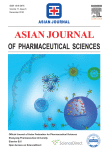
Asian Journal of Pharmaceutical Sciences
Empowering discoveries in the realm of pharmaceutical sciences.Asian Journal of Pharmaceutical Sciences is a prestigious open-access journal published by Shenyang Pharmaceutical University, dedicated to advancing research and developments in the field of pharmaceutical sciences. Since its inception in 2009, the journal has successfully converged a wealth of knowledge and innovation, demonstrating an impressive track record with its open access model adopted in 2013, ensuring global dissemination of crucial research findings. With an outstanding impact factor and consistently ranked in the Q1 category for both Pharmaceutical Science and Pharmacology in 2023, it ranks among the top journals in its field, as evidenced by its impressive Scopus rankings—4th out of 183 in Pharmaceutical Science and 10th out of 313 in Pharmacology, showcasing its high relevance and credibility (98th and 96th percentiles respectively). Researchers, professionals, and students can access a diverse array of articles that encompass groundbreaking studies, reviews, and reports, solidifying the journal's position as a vital resource for anyone engaged in pharmaceutical research. With its commitment to quality and accessibility, Asian Journal of Pharmaceutical Sciences plays an essential role in fostering innovation and collaboration within the global scientific community.

MONATSHEFTE FUR CHEMIE
Advancing Knowledge in the Heart of Chemical SciencesMONATSHEFTE FUR CHEMIE, an esteemed journal published by Springer Wien, has been a significant contributor to the field of chemistry since its inception in the late 19th century. With a rich history spanning from 1880 to the present, this journal provides a platform for innovative research and comprehensive reviews in various areas of general chemistry. Although it currently holds a Q3 ranking in the miscellaneous category of chemistry, its commitment to maintaining high academic standards is reflected in its continued relevance and citation impact, as evidenced by its Scopus ranking. Researchers, professionals, and students engaged in chemical sciences will find this journal a valuable resource for advancing their knowledge and contributing to ongoing discussions in the field. For those looking to stay updated on the latest developments in chemistry while engaging with a storied publication, MONATSHEFTE FUR CHEMIE is a pivotal source of insightful content.
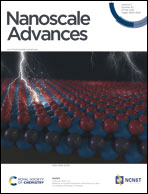
Nanoscale Advances
Exploring the Depths of Nanotechnology Research.Nanoscale Advances, published by the Royal Society of Chemistry, stands out as a leading open-access journal dedicated to advancing the field of nanoscience and nanotechnology since its inception in 2018. With a specialized focus on areas such as atomic and molecular physics, bioengineering, chemistry, and materials science, this journal has consistently achieved top-tier rankings across several categories, reflecting its high-impact contribution to research and innovation. Currently classified in the Q1 quartile for both Atomic and Molecular Physics and Chemistry (Miscellaneous), and Q2 for Bioengineering, its prestige is underscored by impressive Scopus rankings, including a notable 34th position in General Engineering. With its commitment to disseminating high-quality research, Nanoscale Advances serves as an invaluable resource for researchers, professionals, and students alike, fostering collaboration and scholarly exchange in the rapidly evolving landscape of nanotechnology.